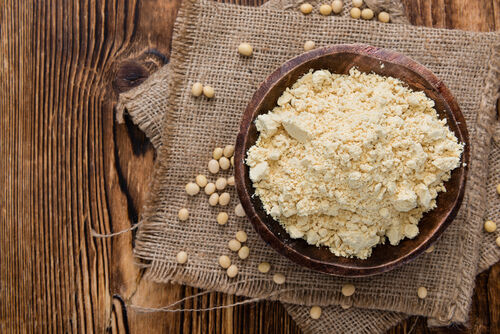
What Is Soy Protein?
Soy protein is made from soya beans and is a by-product of soybean oil. Soy protein is what is left after soybeans have been hulled, ground and had the fat removed. This leaves a powder that can be incorporated into a variety of foods. Soy protein is lactose free and contains little or no cholesterol or saturated fat. Soy protein is commercially available in the form of flour, concentrate or isolates.
Features of Soy Protein

Who Should Take Soy Protein?
Everyone can benefit from taking soy protein. Soy is considered a compete protein and the only vegetable source to contain all the essential amino acids our bodies need for general health, the growth and repair of muscles and boosting our immune system. Including soy protein in the diet on a regular basis will help to reduce cholesterol, resulting in better blood flow and a healthier heart. It has been proven to help in reducing the risk of heart disease, osteoporosis and in preventing certain cancers. Including soy protein in the diet can be beneficial for diabetics, vegans, vegetarians, osteoporosis sufferers and women in the menopausal stage. Soy protein is especially beneficial for anyone wanting to reduce their body fat, athletes and bodybuilders.
- Fat loss – Soy protein can help you feel fuller for longer, curb cravings and temporarily boost metabolism, aiding fat loss, particularly in the abdominal area.
- Athletes – Taking soy protein after a workout is an excellent way to aid muscle repair, help to prevent muscle soreness and speed training progress.
- Bodybuilders – Taking soy protein promotes lean muscle growth especially in conjunction with strength training and latest studies show it does not decrease testosterone levels.
How to Take Soy Protein
The most common form of soy protein is as a powder. Soy protein can be mixed with water, milk or a milk substitute to make a shake and can be easily added to foods such as smoothies, soups and porridge. Soy protein powder can also be used as an ingredient in other recipes such as pancakes, herb coating for meats and fish or in sweets like fudge. Soy Protein Isolate powder is considered a slow to moderate release protein, so is ideal to use alongside other protein sources and supplements but do check the serving instructions on each product if you plan combining supplements.
It is recommended that you consume between 2-5 servings of soy protein per day, dependent upon your own personal needs. A serving would be classed as 30g (one scoop) of Soy Protein Isolate 90. It is recommended that you take 1g of protein per pound of body weight, so adjust your intake accordingly.






No Comments yet!